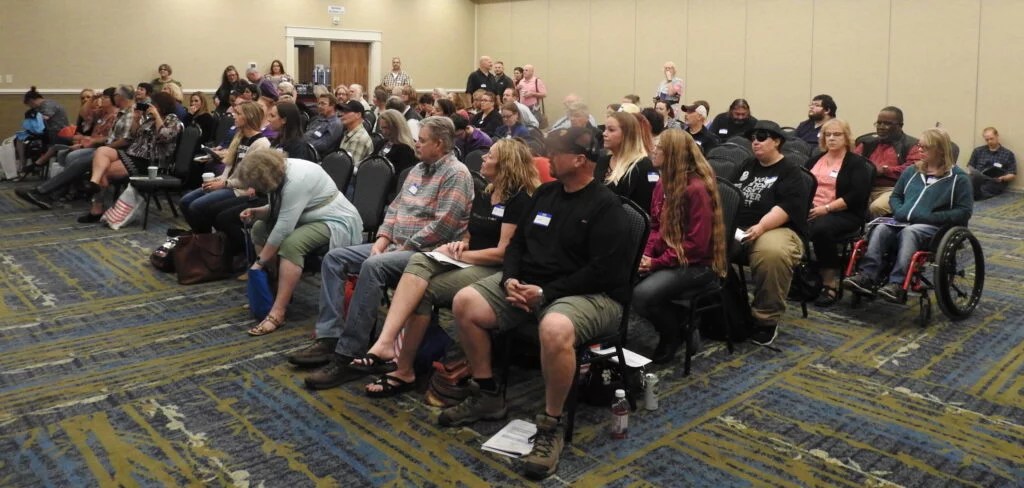We are a network of individuals who are on the path of recovery.
We identify as being in recovery from mental health, substance abuse and or addiction struggles. Together we share information, provide peer support, advocate with a united voice and improve the system. We come from places all across Montana, with different stories and experiences but together we make a difference. This is the Recovery Movement in Montana.


Realizing Recovery Blog
Service Work and Volunteering is Sacred
For most of my life, I didn’t put much time and effort into things unless it was self-fulfilling, of some sort. I always have had a big heart and loved to help feed, support, and be there in any way I could for family and loved ones, but past that, I didn’t do much that was out of my way of comfort, and added to my own status or towards a goal that was for my own selfish needs. As I grew older, I was taught that we do what we can for others, with boundaries. I wanted the acceptance of others and turned into a “Yes” person very early in recovery. I got sober in a program that believed in incentives. It taught me as an adult, that there was appreciation and meaning in going out of my comfort zone to help others.
Embracing the Power of Service Work: A Journey of Recovery and Giving Back
Service work and volunteering hold a profound place in the hearts of individuals in substance use and mental health recovery. As someone who has embarked on a personal journey of recovery for the past 7.5 years, I have come to appreciate the transformative power of giving back. Though many people in substance use recovery will see service work and volunteering through the lens of 12-step programs, there is purpose and value in volunteering outside of the 12-step communities too, especially for those on a different recovery pathway.
Radical Acceptance
When I did this month’s webinar on the topic “Radical Acceptance”, one of the comments was on the word radical paired with acceptance. Radical commonly can be referred to a person who is an extremist in their advocacy on topics that are less than traditional. So, the thought was, I understand acceptance in life and as events happen that are less than acceptable, but how I am expected to radically accept these events as something I am putting an “I am ok with this happening to me” stamp on it?
In the Pursuit of Truth
Radical acceptance is like waking up in the middle of a dream and clearly looking at life for the first time. The reality of what I had created while I was asleep in my addiction was startling. The truth that I was unwilling to look at had built momentum, and the consequences of those choices were overwhelming. Recovery demands honesty; every courageous action forward balances authenticity and vulnerability. It meant I could no longer play the victim of life; I needed to be responsible for the life I could create with a willingness to work hard to heal and forgive.
Radical Acceptance Without DBT
We most often hear about radical acceptance in the context of Dialectical Behavior Therapy (DBT) but the concept can be applied with other therapies as well. Part of radical acceptance is acknowledging our thoughts about ourselves even if we aren’t in the right space to challenge those thoughts directly as with DBT or Cognitive Behavioral Therapy (CBT).
Radical Acceptance Opens the Door to Self-acceptance
Radical acceptance comes in moments of clarity, where denial transforms into connection. The test of my commitment to radical acceptance shows up when I try to fix, control, ruminate about the past, predict the future, or avoid pain.
Radical Acceptance
When I think of radical acceptance, I think of when my only brother passed away. I was in Montana’s Women’s Prison and didn’t have a chance to go to his services. It hurt, and I was sober for the first time since I was a teenager. I was sober, but I wouldn’t say I was in recovery, because I was still living in a way that had many, many character defects.
Radical Acceptance – A DBT Distress Tolerance Skill I Still Utilize
I have struggled with mental health challenges and substance use for most of my life. In my early 20’s I was in and out of psychiatric hospitalizations frequently. I felt everything very intensely and my 20’s were filled with misery, agony, and despair. Though I don’t look back on that time of my life fondly, my difficulties opened the door for me to participate in DBT therapy.
Technology and Mental Health
You have probably heard that computers, phones, social media, and other apps are bad for your mental health. That can definitely be an issue as many things in our lives can affect our mental health. In general, too much of just about anything can be problematic. There are various ways in which technology can adversely affect us but there are great things that technology can do for us.
Mental Health: The Most Important Conversation
Mental Health Awareness month, what a beautiful way to bring awareness to a very important topic. Growing up I considered mental health to be very extreme mental health disorders. For example, depression/suicide, substance abuse/addiction, or diagnosis/personality disorders. Also, feeling statements that were commonly heard and used were simply happy, mad, and sad. Mental health is so much more complex than the ones I listed. I now believe those are the extremes, because mental health hasn’t/hadn’t ever been addressed. Navigating something within ourselves, without the knowledge and words, leads to a recipe for disaster.
Advocacy
Check out our new page dedicated to tracking state and federal bills, executive orders, and lawsuits.
 Standing up for what we believe is right, having a voice, making choices in recovery, and sharing our own recovery story are some of the things that make up advocacy and self-advocacy.
Standing up for what we believe is right, having a voice, making choices in recovery, and sharing our own recovery story are some of the things that make up advocacy and self-advocacy.
Let’s start with self-advocacy which refers to an individual’s ability to effectively communicate, convey, negotiate, or assert his/her own interests, desires, needs, or rights. It involves making informed decisions and taking responsibility for those decisions (Van Reusen et al., 1994).
Knowing yourself and your strengths, needs, and interests is the first step toward advocating for your rights. Once we begin to find our way on the path of recovery, we may want to begin to advocate for ourselves with those around us—peer supporters, friends, family, service providers, and doctors. These conversations may be difficult, but having them is vital to your recovery. Remember, you are the expert on yourself.
It may be that prior to getting on the path to recovery, others were making decisions for you or acting in what they believed to be your best interest. Now may be the time for you to let others know what you believe to be in your best interest. You may find yourself in the process of taking control and making decisions affecting your life and perhaps others’ lives. This process of self-determination means making informed choices, problem solving, setting and attaining goals—essentially being a self-advocate.
Advocacy or advocating for others may be something you are interested in doing. Advocating for another person isn’t about acting in a person’s perceived best interest, but it is standing with a person to ensure they are able to articulate and obtain what they want or need. Perhaps you may consider speaking up and advocating for various changes in the services in your community.
Here are a few examples of advocacy:
- Speak to your legislature or a special committee.
- Get involved with an advocacy group or organization.
- Share your recovery story to support others in recovery.
- Whether advocating for yourself, for others, for your community, or as part of an organization, advocacy is very self-empowering. You can make a real difference in your life, the lives of others, and even the community.
- Reach out to Montana’s Peer Network and share your recovery story on one of our “Recovery Talks” podcasts.
Advancing Advocacy Blog
Societal Issues Affecting Mental Health
It is hard to not see suffering on a daily basis around the world, in the United States and here in Montana. When I tune in for my daily dose of news, I am often struck by the lack of awareness around mental health related issues. For example, in Texas where the extreme flooding occurred there is virtually no reporting on mental health counseling, or peer support for the massive amount of grief and loss that is taking place. In the nearly weekly reporting of mass shootings at places of work, schools and in our communities across the nation, we fail to address mental health needs.
Snapshot - Challenges in the CBHPSS Workforce
The certified behavioral health peer support specialist workforce has faced many challenges since its inception 8 years ago. We fought to establish ourselves in the behavioral health system, we have had to educate and inform the public, and we have had to grow the workforce. MPN has been training peer supporters since 2015 long before certification went into effect in 2018. The basis for the training then and now is the National Practice Standards from SAMHSA. We have trained more than one thousand peer supporters during the last ten years which has provided us with a unique perspective on the workforce. We are not new to the game as are some of the other trainers. Nor are we from out of state here to get wealthy, then disappear after we get a check. We want to see a strong behavioral health peer support workforce now and into the future. In order to do that there needs to be a platform for identifying and addressing the issues. Montana lacks that platform. One that is free from outside influence. At MPN, we have tried many times over the years to participate in such an effort only for it to get corrupted, forcing us to step away. In this article I have broken down the most notable challenges in the behavioral health peer support workforce and some possible solutions.



